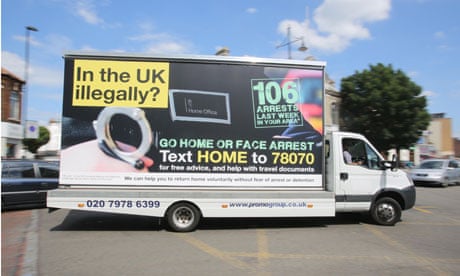The Liberal Democrat president, Tim Farron, has called for the government's new billboards to be shredded. Nigel Farage said it was a nasty campaign with elements of Big Brother. The text on the ads runs: "In the UK illegally? Go home or face arrest." It continues: "106 arrests last week in your area*." The asterisk is there to indicate that this is a made-up figure, relating to no particular area, and no particular week.
But anyway, this was clearly not aimed at the "Westminster bubble"; this was meant to be street politics (though when Farage calls you nasty, there's a chance you've stepped on to a rougher street than one anybody actually lives in). I went out looking for what the man and woman in the street thought – but first I had to find someone who had seen one of these billboards.
The bus in the news was in Kilburn High Street, in Brent, north-west London; by Thursday there was nothing in Kilburn. That's fair enough: they're mobile; they're meant to move. Nothing outside Willesden station, nothing in Harlesden, nobody who had seen one.
At this point, I made the phone call I should have made before I started: I asked the Home Office how many billboards there were. "Two." "Two in each borough?" "Two across all six boroughs."
Rita Chadha, from the Migrant and Refugee Forum of East London, pointed out how bizarrely the scheme has been executed. "None of the boroughs knew anything about it. No local council had been consulted. Even the police knew nothing about it. So the text says: 'Go home or get arrested.' Who's going to arrest them? [Immigration minister] Mark Harper?"
The choice of borough is illogical: Ealing, Brent, Hounslow, Redbridge, Barking and Dagenham were apparently picked because they had either low levels of immigrants voluntarily leaving, or high levels. Rupa Huq, the former deputy mayor of Ealing and the author of On the Edge: the contested cultures of English suburbia, said: "They seem to be aiming for these Colonel Blimpish characters, with a rolled-up copy of the Telegraph under their arm, but suburbia doesn't look like that any more."
Anyway, back to the man on the street. Armed this time with a picture of the van, on the assumption that no one will have seen it, I arrived in Ealing. John, 33, shrugs at the van. "If I'm honest with you, I don't mind somebody coming over here, working, paying their taxes." What if they're here illegally? "Well, that poster's not going to change anything. Someone will see it, laugh at it, walk off and carry on being illegal."
Sachin, 32, has never seen a poster, but thinks the Home Office has its priorities wrong. "Many people don't want to be illegal, they want to work. They get their own rules wrong. At the moment, I have a visa, my wife's been turned down. It's a mistake, they'll correct it. But we've already waited three and a half months and she can't work. They have terrible problems with their bureaucracy."
Three bus drivers – of the E2, the E7 and the E9 – all take the route that the billboard is supposed to take, but none has seen the billboard. One, who wished to remain anonymous, said: "I think it's good. I think illegal people should go home." He's from Afghanistan, but has had legal status here for 17 years. Elena, 28, is from Ethiopia originally, and lives here with her Dutch husband. She thinks it will take more than a poster campaign to make people leave. "I have been all over the world. I have seen people deported. They're dragged off the streets, screaming."
I go on to Southall, but see nothing, and meet nobody who's seen one. I am beginning to doubt there are even two billboards; I think there was one, for the photocall, and they claim another, to make it look like they didn't just do one for a photocall.
I call back the Home Office, and ask: if this is a pilot scheme, what does success look like? "It will be assessed broadly to see how successful it was on a number of levels." "What levels?" "They'll look at it to see how it's worked across the board." "What board?" "To see if it does what it set out to do." Are they counting the number of voluntary returnees? Or the number of votes the Conservatives took off Ukip? Are they going to poll illegal immigrants on what influenced their decision to leave? Or poll UK citizens on how tough they think Conservatives are on immigration? Have they got a baseline of people who typically return of their own accord? What's the time period? "I don't think we're going to discuss any details." "If this is a pilot, you should be able to tell me how you're going to assess it." "I can send you a statement about our reasons for the pilot," he says. "You're sticking with 'pilot', are you?" "As opposed to?"
Publicity stunt; naked electioneering; misuse of public money and Home Office time; state-sponsored incitement to racial hatred – I could go for hours before I arrived at the word "pilot".

